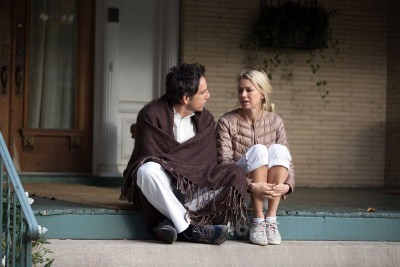
Noah Baumbach’s latest film, “While We’re Young,” opens with a silent epigraph from 19th century Norwegian playwright Henrik Ibsen’s “The Master Builder”: “I’ve become so disturbed by younger people! … They upset me so much that I close my doors.”
It’s a sly, self-lacerating way to open a film whose major targets are those of us so resistant to looking forward that we don’t even realize we’re stuck in the past.
Baumbach knows a thing or two about nostalgia. The 45-year-old filmmaker and Brooklynite has made a career of either observing people who live in rosy days gone by (“Kicking and Screaming,” “The Squid and the Whale” and “Margot at the Wedding”) or evoking a bygone era himself (2013’s black-and-white, French New Wave “Frances Ha”).
His latest, however, is perhaps his first project that’s explicitly about nostalgia. The film centers around two couples. Josh and Cornelia (Ben Stiller and Naomi Watts, operating at their respective peaks) are upper-middle class New Yorkers entering their mid-40s, childless and burned out. Cornelia has had a number of miscarriages, and their ensuing resistance to starting a family has alienated the pair from their baby-centric peers. Jamie and Darby (Adam Driver and Amanda Seyfried) are Josh and Cornelia’s antitheses: ambitious, spontaneous 20-somethings who make their own furniture and travel by rollerblade — poster children for the post-irony Bushwick millennials.
Josh and Cornelia are in the film industry — she produces for her legendary father Leslie (Charles Grodin), while he has been working fruitlessly on the same documentary for nearly a decade, riding the coattails of his first film’s success.
Jamie and Darby meet Josh during his lecture at a local community college, and he is immediately sucked into their world — one where the VHS has usurped digital streaming, and ice cream is something you make from avocados in your own kitchen. Josh and Cornelia quickly abandon their old friends for psychedelic meetings with shamans and afternoon hip-hop classes.
If it all sounds broad and obvious, it isn’t. Sure, this is his most accessible film to date, but Baumbach is still padding scenes with classical music (and David Bowie) and refusing us easy answers.
The bulk of the plot revolves around Josh helping Jamie direct his own documentary, which inadvertently unearths uncomfortable truths about Josh’s work and questions the nature of artistic integrity. “While We’re Young” is a comedy, quite successfully and unabashedly so, but the laughs stick. Baumbach is interested in finding truth even as he questions its necessity. He digs into unfulfilled expectations in ways that breach melancholy even as we’re pierced by his quick, sharp wit.
Some of the film’s funniest moments lie in Baumbach’s uber-conscious take on the counterintuitive differences between the ways midlifers and millennials use technology. Josh thumbs through his CDs while Jamie puts on records, Cornelia types away at her laptop while Darby scribbles in an antique notebook, the older couple struggle with their Apple TV while the younger rewinds their VHS copy of “The Goonies.” When Jamie prepares Josh for a meeting with a potential investor, he pumps him up with “Eye of the Tiger.” “I remember when this song was just considered bad,” Josh quips.
It makes sense. Millennials have grown up surrounded by emerging technologies and have learned how to absorb them into their lives and take them for granted, while those beyond their mid-30s, for whom Netflix is a novelty, have had no such luxury. A lesser filmmaker would go for the easy “These kids and their Snapchat!” jokes, but, refreshingly, nothing about “While We’re Young” feels easy.
“While We’re Young” is also admirably resistant to classifying its characters as unqualified heroes or villains. Josh, whose perspective we inhabit most thoroughly, is deeply unlikeable for much of the film’s second half, as he is consumed by bitterness and unreasonable paranoia about Jamie’s intentions. Yet it’s also easy to see where he’s coming from: Driver plays Jamie as a smug social climber, and his success grates away at Stiller’s exhausted documentarian.
All of the lead performances are stellar, but it’s Driver who makes things truly click. Also working with Baumbach on “Frances Ha” and appearing opposite Lena Dunham in HBO’s “Girls,” Driver has become a cipher for the painfully urban, intriguing 20-something. His Jamie is frustrating, charismatic, vibrant and calculating. We hate and admire him all at once. Toward the end of the film, he tells Josh, “We all want things. That doesn’t make us douchebags.” It’s to Baumbach’s credit that we believe him, no matter how much we don’t want to.
Speaking about the film at an advance screening at the Brattle Theater in Cambridge on March 19, Baumbach mentioned that inspiration for “While We’re Young” came from a longing for the adult, character-driven studio comedies that were being produced in the mid-1980s. He wanted to make his own version of something like “Tootsie” or “Working Girl,” and while neither of those are bad reference points, what he’s really done is made a very good Woody Allen film with a David Bowie soundtrack. In terms of age, that’s not a bad way to remain timeless.
























































































































